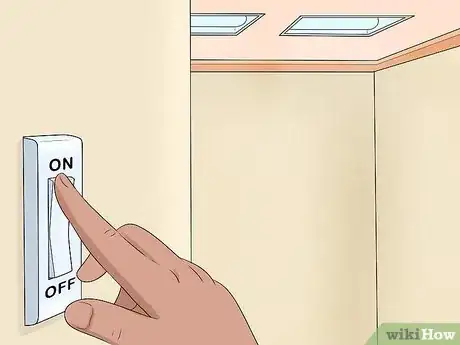This article was co-authored by wikiHow Staff. Our trained team of editors and researchers validate articles for accuracy and comprehensiveness. wikiHow's Content Management Team carefully monitors the work from our editorial staff to ensure that each article is backed by trusted research and meets our high quality standards.
There are 11 references cited in this article, which can be found at the bottom of the page.
This article has been viewed 1,023,204 times.
Learn more...
If you've ever pulled an all-nighter or had a bad night of sleep, you know it's difficult to stay awake in class when you're tired. Classrooms can be boring, dark, and your teacher's voice might begin to sound like a lullaby. To keep yourself awake, you can participate in class, come prepared with snacks, and get creative with your strategies.
Steps
Participating in Class
-
1Sit in the front of the room. You'll be more motivated to stay awake if you know that the teacher can see you. Plus, it'll be easier to pay attention and participate when you're front and center for the lecture. You'll also be near people who are more likely to participate, and the sound of their voices might keep you awake.[1]
-
2Participate in class discussion. Ask and answer questions and pay attention to the lecture. This will help if you're tired or frustrated with the content of the lecture because you can ask your teacher questions to try to get to the bottom of the problem. Talking will also keep you engaged and alert.[2]
- It might be helpful to make a goal for yourself to answer or ask at least 3 questions per class.[3]
- Try to keep your questions on topic to avoid annoying your teacher. For example, you might say “I didn't understand the last part of the proof. Could you explain it again in more detail?”
Advertisement -
3Listen actively to the lesson. Active listening is a great way to force yourself to stay awake because it requires engagement of your mind as well as your body. Even if you don't take notes, practicing active listening can help you keep your eyes open for the length of the lesson.[4]
- To effectively listen to your teacher, you should try to maintain eye contact, face the speaker, pay close attention, visualize what the speaker is saying, ask questions during a pause in the lecture, respond to prompts, and make note of gestures or a tone of voice that portray whether the information might be particularly important.[5]
-
4Interact with your classmates. Group discussions are a great time to regroup and keep yourself awake. Engage in conversation and contribute meaningful points. Try to sit yourself near people who always volunteer in class and will have a lot to say in discussion.[6]
-
5Take detailed notes. This is a good way to help you pay attention and stay engaged. Listen closely to the lecture and try to be as detailed as possible. You can use different highlighters and pens to denote different sections, switching colors occasionally to keep your mind alert.[7]
- Some people are visual learners. If that's you, doodle on the page about what you're learning. Mind maps, pictures, and flow charts are all helpful for learning.
-
6Ask your teacher to turn on the lights. If you know you're going to have a hard time staying awake before class, approach your teacher and ask them if the lights can stay on today. Unless you're watching a movie or reading from a PowerPoint, they're likely to oblige.[8]
-
7Employ the buddy system to stay awake. Sit by someone who doesn't have problems staying awake in class. Before class starts, ask them if they can poke you or move your chair if you start to fall asleep. Having someone to keep you accountable can make it a little easier to stay awake.
Staying Awake with Food and Drinks
-
1Grab a cup of coffee or caffeinated tea before class for a caffeine boost. Especially before a long lecture, a cup of coffee or tea can kick in right when you might start dozing off. If you can, grab a large latte or brew a cup at home and take it in a to-go mug. The caffeine will kick-start your system in no time![9]
-
2Bring an energy drink for a shorter burst of energy. If you're allowed to have drinks in class, an energy drink like Red Bull might be the solution you need if you don't like coffee. However, if you choose this method, you can expect to have a sugar “crash” later on in the day.[10]
- Energy drinks should be used sparingly because they contain very high amounts of both caffeine and sugar, which can cause you to become more tired over time with continuous use.
-
3Drink some cold water to keep yourself awake and aware. Come prepared to class with a bottle of cold water. Not only will you be hydrated, but you'll also get a little energy from the chill every time you take a drink. The hydration will keep you alert and can also help you avoid feeling confused and fatigued.[11]
-
4Eat three healthy meals per day. Whether your class is in the morning, afternoon, or evening, eating three regular, balanced meals per day will help you fight fatigue. The food will give you energy and help you stay awake and alert. You should avoid heavy foods like pasta right before class as they can make you sleepy.[12]
- Your healthy meal should include fruit, vegetables, protein, complex carbohydrates, and healthy fats.[13]
- For example, a great pre-class breakfast would be greek yogurt, topped with granola or bran flakes, and berries.
-
5Pack some snacks for class to keep your energy up. If your teacher allows it, bring a snack to break up the lecture and keep you alert. Snacks can keep your energy levels up and give you something to do instead of thinking about how tired you are.[14]
- Try to pack healthy snacks like nuts, berries, fruit, or vegetables such as baby carrots or celery sticks.
- Don't be too loud with your snacking and try not to draw attention to yourself. Other people might find the noise disruptive.
- Avoid fatty, sugary, or salty foods because they can make you feel more tired.
Taking Care of Your Body
-
1Sleep for at least 8 hours each night. Getting enough sleep routinely is the best way to make sure you stay awake in class with good energy levels. For most students, 8 hours is enough sleep to get them through the day, but you might need more depending on your energy levels. Going to bed at the same time every night will train your body to know when it should be sleeping and when it needs to be awake.[15]
- Before you go to sleep, give yourself time to relax and unwind before bed, without phones, homework, or other stressors.
- In combination with regular exercise and healthy eating, getting enough sleep can alleviate most daytime fatigue problems.
-
2Sit up straight and stretch in your chair. Maintaining good posture can keep you awake and your body alert. You can stretch a little in your chair to help you feel refreshed. Start by rolling your wrists, shoulders, and neck.[16]
- You can make it a challenge to keep yourself from slouching. Every time you notice yourself beginning to slouch, adjust your posture and sit up straight.
- If you have a choice, sit in a chair or desk that is slightly uncomfortable to keep you from slouching.
-
3Walk around before or after class. Physical activity tells your body that it's not time for sleep just yet. Walk around during breaks, go outside if you're allowed to, and get your blood moving to improve alertness. After you stop moving, you might feel tired again, but it can help for a little bit.[17]
- If you're falling asleep in class, excuse yourself to walk to the bathroom and back. Even a short walk can wake you up.
- Take the stairs on your way to class. It can get your heart rate up and make you feel more alert.
Expert Q&A
Did you know you can get expert answers for this article?
Unlock expert answers by supporting wikiHow
-
QuestionHow can I force myself to stay awake?
 Andrea Rudominer, MD, MPHDr. Andrea Rudominer is a board certified Pediatrician and Integrative Medicine Doctor based in the San Francisco Bay Area. Dr. Rudominer has over 15 years of medical care experience and specializes in preventive health care, obesity, adolescent care, ADHD, and culturally competent care. Dr. Rudominer received her MD from the University of California, Davis, and completed a residency at the Lucile Packard Children's Hospital at Stanford University. Dr. Rudominer also has an MPH in Maternal Child Health from the University of California, Berkeley. She is a Member of the American Board of Pediatrics, a Fellow of the American Academy of Pediatrics, a Member and Delegate of the California Medical Association, and a Member of the Santa Clara County Medical Association.
Andrea Rudominer, MD, MPHDr. Andrea Rudominer is a board certified Pediatrician and Integrative Medicine Doctor based in the San Francisco Bay Area. Dr. Rudominer has over 15 years of medical care experience and specializes in preventive health care, obesity, adolescent care, ADHD, and culturally competent care. Dr. Rudominer received her MD from the University of California, Davis, and completed a residency at the Lucile Packard Children's Hospital at Stanford University. Dr. Rudominer also has an MPH in Maternal Child Health from the University of California, Berkeley. She is a Member of the American Board of Pediatrics, a Fellow of the American Academy of Pediatrics, a Member and Delegate of the California Medical Association, and a Member of the Santa Clara County Medical Association.
Board Certified Pediatrician & Integrative Medicine Doctor If you're tired of feeling sleepy at school, there are some simple things you can do. Eating a balanced diet with lots of fruits and veggies, getting regular exercise, and getting enough quality sleep are great ways to boost your energy levels. And if you need a little caffeine, green tea is a healthier option that also provides antioxidants for your overall health.
If you're tired of feeling sleepy at school, there are some simple things you can do. Eating a balanced diet with lots of fruits and veggies, getting regular exercise, and getting enough quality sleep are great ways to boost your energy levels. And if you need a little caffeine, green tea is a healthier option that also provides antioxidants for your overall health. -
QuestionWill tea help us in the morning to wake up?
 Samantha L. CampbellCommunity AnswerYes, some teas have just as much caffeine in them as coffee and can give you a caffeine boost when you wake up.
Samantha L. CampbellCommunity AnswerYes, some teas have just as much caffeine in them as coffee and can give you a caffeine boost when you wake up. -
QuestionWhat drink can we take to avoid falling sleep other than mineral water in classroom?
 Samantha L. CampbellCommunity AnswerTea, coffee, sports drinks, energy drinks, and juice are all good alternatives to mineral water. However, these drinks can cause you to have a sugar or caffeine "crash" a few hours after drinking them, which can make you even more tired. Water and mineral water won't cause this crash.
Samantha L. CampbellCommunity AnswerTea, coffee, sports drinks, energy drinks, and juice are all good alternatives to mineral water. However, these drinks can cause you to have a sugar or caffeine "crash" a few hours after drinking them, which can make you even more tired. Water and mineral water won't cause this crash.
Warnings
- Don't consume too much caffeine during the day to stay awake. If your heart starts beating fast or you feel nervous and antsy, don't have any more caffeine.⧼thumbs_response⧽
References
- ↑ http://blog.cengagebrain.com/blog/2014/02/wake-up-here-are-five-ways-to-focus-in-class/
- ↑ http://blog.cengagebrain.com/blog/2014/02/wake-up-here-are-five-ways-to-focus-in-class/
- ↑ http://blog.cengagebrain.com/blog/2014/02/wake-up-here-are-five-ways-to-focus-in-class/
- ↑ https://www.forbes.com/sites/womensmedia/2012/11/09/10-steps-to-effective-listening/
- ↑ https://www.forbes.com/sites/womensmedia/2012/11/09/10-steps-to-effective-listening/
- ↑ https://www.theguardian.com/education/2016/apr/09/does-working-as-a-group-actually-help-us-learn
- ↑ http://www.utica.edu/student-blogs/staying-awake-in-night-class/
- ↑ https://www.thedailybeast.com/five-healthyand-legalways-to-stay-awake-longer
- ↑ https://www.inc.com/kevin-daum/12-non-caffeinated-ways-to-wake-up-at-work.html
- ↑ http://www.huffingtonpost.com.au/2016/09/28/we-found-out-if-energy-drinks-are-actually-bad-for-you_a_21480603/
- ↑ http://www.businessinsider.com/stay-awake-without-caffeine-2016-9
- ↑ http://www.utica.edu/student-blogs/staying-awake-in-night-class/
- ↑ https://www.shape.com/lifestyle/mind-and-body/best-foods-all-day-energy
- ↑ https://spoonuniversity.com/lifestyle/9-snacks-that-will-help-you-stay-awake-while-studying
- ↑ http://www.apa.org/helpcenter/sleep-disorders.aspx
- ↑ https://www.inc.com/kevin-daum/12-non-caffeinated-ways-to-wake-up-at-work.html
- ↑ https://www.inc.com/kevin-daum/12-non-caffeinated-ways-to-wake-up-at-work.html
About This Article
If you had a bad night’s sleep or had to pull an all-nighter studying, you might have to fight to stay awake during school. One way to get motivated to stay awake is to sit in the front of the room where the teacher can see you. This will also make it easier to pay attention and participate. Another way to stay awake is to use certain foods and drinks. For example, grab a cup of coffee or caffeinated tea before class. You can also bring an energy drink to school with you. Sipping on a cold bottle of water can also give you a little energy by keeping you hydrated and alert. Eating a healthy breakfast high in protein, like yogurt topped with berries or granola, should also help wake you up. If your teacher allows it, pack some snacks for class too, like nuts, fruit, or veggies. To learn how to use some light exercise to stay awake between classes, keep reading!









































































